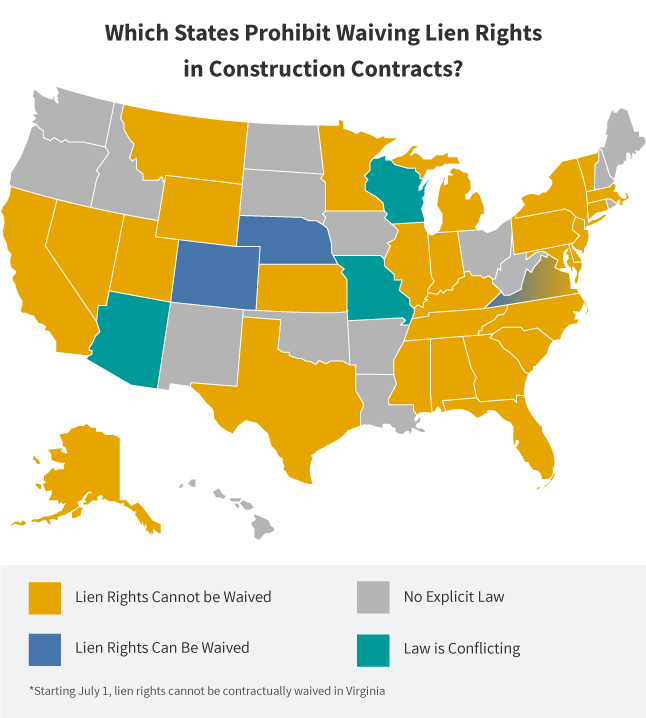
Can You Waive Lien Rights Before Starting Work?
Can you waive your right to file a mechanics lien or bond claim before you even begin working on a project? Attempts to make subcontractors and suppliers waive lien rights at the start of a project — so called “No Lien Clauses” — are usually void and unenforceable. However, the law on whether or not you can waive lien rights before work is not clear everywhere.
The above color-coded national map demonstrates where the law is clearly in favor of and against these practices. Everywhere else falls into an ambiguous stew of silence on the topic. This article addresses the concept of no lien clauses, and the corner cases that frame the issue nationwide.
No Lien Clauses And Waiving Lien Rights In Your Contract – Breakdown of State Rules
A “no lien clause” is simply a clause within a construction contract, or a lien waiver document signed before the furnishing of work, whereby a subcontractor or supplier agrees to not file a lien or bond claim on the project. In other words, the subcontractor or supplier agrees to perform the work without the security of a potential claim if unpaid.
As a general rule, these types of agreements are unenforceable. United States law allows parties to contract between themselves however they wish…but, contracts must always be consistent with the state’s public policy. You can’t contract to murder someone, for example. Likewise, you can’t contract around the state’s interests in protecting subs and suppliers against non-payment.
Many states have expressly stated within their lien laws that such “no lien clauses” are invalid. These states are highlighted in red in the above chart. Other states, however, are silent on the issue (the gray states). It’s safe to say that many of these gray states would follow the red states, disallowing these clauses.
Only three states break from the pack to expressly allow these clauses: Colorado, Nebraska, Virginia. (Beginning July 1, Virginia will no longer allow no lien clauses.) Be careful in these jurisdictions.
Substantial Consequences To Those Who Violate Restriction in Some States
Most states are quite serious about the rule against no lien clauses. Take, for instance, the law in Tennessee, where TCA § 66-11-124(b) makes it possible for a contractor to lose their license if they make an attempt to violate the restriction:
(1) Any contract provision that purports to waive any right of lien under this chapter is void and unenforceable as against the public policy of this state.
(2)(A) If a contractor solicits any person to sign a contract requiring the person to waive a right of lien in violation of this section, the person shall notify the state board for licensing contractors of that fact…(B) If the contractor does not delete the waiver of lien provision, then the executive director shall schedule a hearing for appropriate action by the board. If the board finds after a hearing that the contracts of the contractor are in violation of this section, the contractor’s license shall be immediately revoked.
Similar protections are found in other state laws, and sometimes, they can result in criminal charges. That is the case in Illinois, for example, where § 60/21.01 provides that its a Class A misdemeanor if a contractor has a subcontractor execute and deliver a waiver of lien if the contractor fails to pay the subcontractor money received from the work waived within 30 days.
The Weird Case in Wisconsin
The lone yellow state in the chart is Wisconsin, wherein we report that the “law is conflicting.” While it is nice to think of our legislatures being super efficient at writing laws, it is not uncommon for laws to conflict with one another and overlap. That seems to be the case in Wisconsin as it relates to the no lien clause.
For instance, WSA § 779.03 provides that “No agreement by anyone other than claimant may invalidate lien. Subject to § 779.05, a lien claimant may waive the lien…by a writing signed by the lien claimant, but no action by nor agreement between any other persons shall invalidate the lien.”
The referenced §779.05 looks bad for lien claimants, and seems to suggest that Wisconsin is like Virginia, Colorado, and Nevada, in that claimants are allowed to waive their lien rights before work and/or before receiving payment. See this quote from the provision:
(1) Any document signed by a lien claimant or potential claimant and purporting to be a waiver of construction lien rights under this subchapter, is valid and binding as a waiver whether or not consideration was paid therefor and whether the document was signed before or after the labor, services, materials, plans, or specifications were performed, furnished, or procured, or contracted for. Any ambiguity in such document shall be construed against the person signing it.
But, this is challenged by another Wisconsin statute, governing construction contracts, § 779.135, which provides:
The following provisions in contracts for the improvement of land in this state are void:
(1) Provisions requiring any person entitled to a construction lien to waive his or her right to a construction lien or to a claim against a payment bond before he or she has been paid for the labor , services, materials , plans, or specifications that he or she performed, furnished, or procured.
There are a lot of nuances between these two statutes that could produce legal arguments on both sides of the no lien clause question. If you’re lucky (or smart) you will avoid these arguments, because they are expensive arguments to make, and the court’s resolution of it will be unpredictable.
Related article: Ultimate Guide to Lien Waivers in Construction

